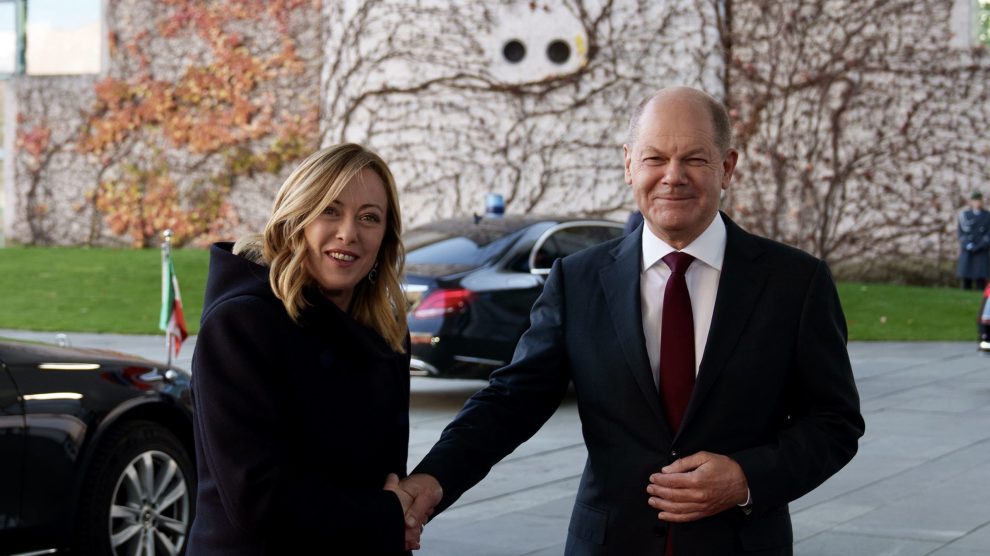The Action Plan is finally here. A slate of the Italian government’s most important members travelled to Berlin to attend an intergovernmental summit with their local counterparts and sign the long-awaited bilateral cooperation agreement encompassing the political and economic spheres. “Our cooperation takes an important leap forward,” said Italian Prime Minister Giorgia Meloni during a joint presser, noting the Action Plan “raises our cooperation to a new level” and “explores new areas of dialogue.”
- The five-point plan concerns five key sectors, explained German Chancellor Olaf Scholz, stressing that Italy and Germany have “long-standing cooperation and a friendship that has united us for many years” and the deal “will bring new cooperation plans and new partnerships.”
- This is good news for Italians and Germans and excellent news for Europeans, added PM Meloni, because the countries had reaffirmed “their willingness to strengthen the partnership and dialogue at a crucial time for our continent [which requires] making decisions and taking responsibility.”
Who was there. Economy Minister Giancarlo Giorgetti, Foreign Minister Antonio Tajani, Defence Minister Guido Crosetto, Enterprise Minister Adolfo Urso and Interior Minister Matteo Piantedosi accompanied PM Meloni. They immediately kicked off this renewed cooperation by meeting with their counterparts – Finance Minister Christian Lindner, Foreign Minister Annalena Baerbock, Defence Minister Boris Pistorius, Enterprise Minister Robert Habeck and Interior Minister Nancy Faeser.
The origin story. First announced by Chancellor Olaf Scholz and then-PM Mario Draghi in December 2021, the process was delayed by the change at Italy’s helm and tensions over migration. Still, the two governments have been cooperating closely on a number of key sectors – including critical raw materials, artificial intelligence and space – amid a wider EU push to coordinate better responses to external shocks.
The nitty-gritty. The agreement covers five strategic areas of cooperation, namely foreign and defence policy, economy, the EU, climate and environment, and culture. It also provides for the creation of a 2+2 meeting format between the Italian and German foreign and defence ministers, as well as a bilateral macroeconomic forum between the two finance ministers and an institutional dialogue on migration between the interior ministries.
Closing the triangle. By reinforcing Rome and Berlin’s cooperation in these sectors, the Action Plan would effectively bring to life a novel France-Germany-Italy framework – complementing the historical Franco-German engine with Italy’s political and productive prowess as the EU’s second-largest manufacturing power.
- Italy and Germany’s economies are closely interconnected, reaching €168.5 billion in trade in 2022. The Action Plan’s text specifically mentions cooperation in the areas of automotive and sustainable mobility, among the strongest shared industries.
- “We are increasingly one production system, and it is time for the two governments to act accordingly,” said Jörg Buck, Managing Director of the German-Italian Chamber of Commerce.
- This deal follows in the wake of the 2021 Quirinal Treaty between Italy and France and the 2019 Aachen Treaty between France and Germany, which also seeks to maximise political and economic cooperation.
The expert’s take. Still, as Michele Valensise (former Italian Ambassador to Germany and former Secretary-General of the Italian MFA) told our sister website, the Italo-German plan “has a different form: it is not a treaty, it will not be subject to parliamentary ratification. But beyond the form, it is worth focusing on the substance. And the substance is that of an operational plan that links the two countries’ crucial sectors […] in a more structured manner, with perhaps even greater flexibility than a treaty can have.”
Let’s talk fiscal rules. It’s no coincidence the Italian economy minister met with his German homologue just days after meeting his French colleague, Bruno Le Maire, in Paris: the chances of reaching an agreement to reform the EU’s Fiscal Pact by year’s end depends largely on these countries’ entente, and this triangulation could be the key.
- During the presser, Chancellor Scholz spoke about the two governments having “good discussions” and having made “progress” on how to develop the Pact. “We do not have the solution, but we are on the right track,” he said.





